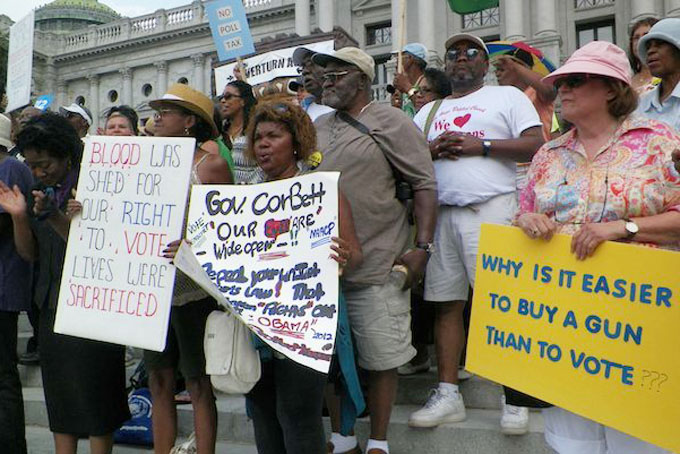
Protestors gather on the steps of the Pennsylvania State Capitol to oppose the voter ID law in advance of court hearings July 25, 2012. (Photo by Brentin Mock/Colorlines/File)
The plaintiffs challenging the constitutionality of the state’s Voter ID Law ended the first week of their Commonwealth Court case, by presenting a political communications professor who testified the state’s education and outreach efforts about the law’s requirements were lacking.
These are key factors in the challenge to the law, which rests on the implementation, or lack of implementation, of efforts to ensure as many people as humanly possible have the proper form of ID to comply with the law.
Last year, the Pennsylvania Supreme Court told Commonwealth Judge Robert Simpson to reconsider his ruling that the Voter ID Law was constitutional. Simpson then suspended the law for the 2012 General Election or the May Primary. It will not go into effect unless and until the state satisfies problems the law’s implementation failed to address. Commonwealth Judge Bernard McGinley is hearing this current challenge.
The main problem, outlined in statistics presented earlier in the week that showed as many as 150,000 registered voters did not have a valid photo ID, comes down to the inability of certain populations—primarily the elderly, students, and some minorities—to get one of the acceptable forms of photo ID.
This week, Michael Rubin, one of attorneys for the challengers, which include the American Civil Liberties Union, the NAACP and several unions, produced documentation showing that in 2011, the Department of State and Gov. Tom Corbett’s office were aware that these issues could prevent some residents—particularly those in nursing facilities—from getting a valid, current photo ID as outlined in the law.
None of he suggested changes, such as allowing a broader range of IDs, including expired driver’s licenses for voters older than 65 and photo IDs issued by counties, municipalities and school districts and care facilities were implemented by the legislature. The 2011 memo even mentioned the idea of not requiring expiration dates on IDs.
The requirement for an expiration date, which student and military IDs do not have, was retained, requiring further modification. But the state now allows those recommended IDs, and because PennDOT will issue, for free, a Department of State voter ID that is valid for 10 years, it maintains that anyone that wants to vote can do so. PennDOT will make exemptions for residents with mobility problems who have photos on file, and of course there is always the option for absentee voting.
One issue the challengers have yet to raise, but which Duquesne University Law professor Tracy McCants Lewis mentioned at the YWCA’s Rally Against Racism in April, is the problem faced by elderly Blacks who, due to overt racism and Jim Crow laws in the south, were not born in hospitals and therefore have no birth certificate to provide the proof the Voter ID application required.
The Department of State ID, however, requires only a person’s name, address, date of birth, social security number—if they have one—the county where they live, and any previous name or address if changed within the last twelve months. The person fills out an application, which can be downloaded ahead of time, and an affirmation that they are a registered voter.
All of this, however returns to the earlier complaint that despite spending $5 million on outreach the state has not informed voters of these changes, some of which were only implemented just before Simpson suspended the law.
Last week, 71-year-old Marian Baker testified that she missed voting for the first time during the May primaries because a poll worker told her in November that photo identification would be required in future elections. That was true at the time, but Simpson extended the suspension in February.
Lawyers for the challengers were still presenting their arguments as of New Pittsburgh Courier deadline.
(Send comments to cmorrow@newpittsburghcourier.com.)
Your comments are welcome.
Follow @NewPghCourier on Twitter https://twitter.com/NewPghCourier
Like us at https://www.facebook.com/pages/New-Pittsburgh-Courier/143866755628836?ref=hl
Download our mobile app at https://www.appshopper.com/news/new-pittsburgh-courier